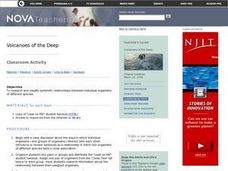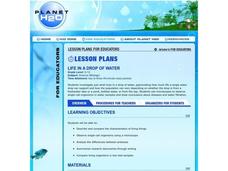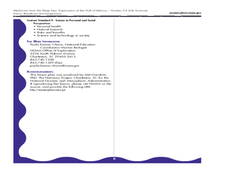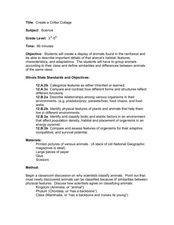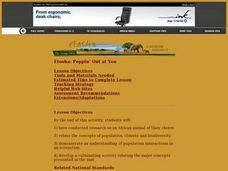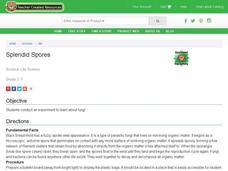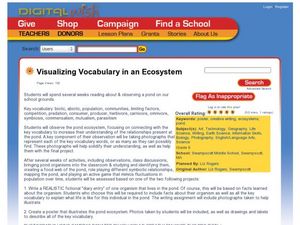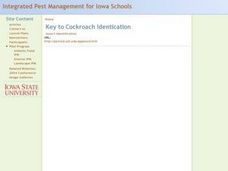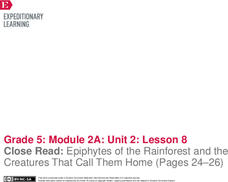Curated OER
Volcanoes of the Deep
Students discuss how organisms relate to one another. They work together to research a specific organism and how it relates to other organisms. They present their findings to the class.
Curated OER
Wild Arctic
Young scholars explore key terms, including food web and food chain. They discuss Arctic plants and animals, devise at least three Arctic food chains and create a food web showing connections among Arctic life.
Curated OER
Life in a Drop of Water
Students examine the structure, function, and characteristics of microscopic organisms that inhabit freshwater through collection of water samples and observation through microscopes.
Curated OER
Trichinella Forensics
Students engage in DNA manipulation using forensics techniques. Students investigate topics involved in forensics studies such as cloning, electrophoresis, gene mapping, replication, and transcription.
Curated OER
Microfriends: Medicines from the Deep Sea
Students explore the concept of beneficial microorganisms. In this microorganisms lesson plan, students observe different bacteria found in organisms Students discuss and describe three ways that microorganisms benefit humans.
Curated OER
The Monarch Watch
Students collect and examine the life cycle of monarch butterflies. They also tag butterflies and release them as part of a nation-wide project to study monarch butterfly migration.
Curated OER
Infectious Disease Detectives
Young scholars participate in a simulation of how diseases are transmitted. Each student holds a test tube, with only one containing the "disease" while the others have water. They move around the room until told to stop. Using...
Curated OER
Ah Choo!
Middle schoolers compare bacteria to viruses to find the differences. For this biology lesson, students research viruses they have been inoculated against, using the Internet. Middle schoolers complete a graphic organizer of their...
Curated OER
Create a Critter Collage
Young scholars create a collage. In this animal classification lesson, students discuss why and how scientists classify animals. Young scholars view pictures of different animals and decide which class each animal belongs to. Students...
Curated OER
Co-evolution of Plants and Pollinators
Students explore biological evolution and natural selection and its evolutionary consequences. They also explore how organisms are interdependent on one another.
Curated OER
Etosha: Poppin' Out at You
Tenth graders research an African animal of their choice and relate the concepts of population, climate and biodiversity to their animal. They examine how population interacts in an ecosystem.
Curated OER
Habitats and Adaptations
Students research and describe the habitat and adaptations of a reef animal. After the student is assigned a habitat, they design and draw a cresture adapted to eat each food and to live in each habitat.
Curated OER
Viruses and Host Evolution
Students are organized into groups of four. On Day 1 they are given a worksheet about viruses and their effects on the evolution of a rabbit population. After about 30 minutes of group work, a class discussion of the material begins. ...
Curated OER
Splendid Spores
Young scholars explore fungi. In this fungi lesson, students take a slice of bread and leave it outside for a day. Young scholars record their observations of the fungi on the bread the following day.
Curated OER
Create a New Animal
Students understand what physical adaptations are and how they help an animal to survive. In this adaptations lesson, students research four animals and then make an original animal that has adaptations to make them survive.
Curated OER
Visualizing Vocabulary in an Ecosystem
Sixth graders observe the pond ecosystem. In this ecosystem lesson plan, 6th graders observe the organisms at the pond and create a poster that illustrates the pond.
Curated OER
Marine Protected Areas (MPA)
Ninth graders explain the purpose of MPA's. In this biology lesson plan, 9th graders identify MPA's in Southern California. They simulate coastal sampling using candy from two buckets. Students analyze their results and share it with the...
Curated OER
Environment: Insects and Pesticides
Students classify bugs as pest or non-pests and identify ways to control them. They also examine the three levels of pesticides by reading the labels. Students complete charts of signal words on pesticide labels.
EngageNY
Close Read: Epiphytes of the Rainforest and the Creatures That Call Them Home (Pages 24–26)
It's all connected. Scholars use pages 24-26 of The Most Beautiful Roof in the World to identify the relationship between the plants and animals in the rainforest. They answer and discuss questions about the relationship with a group....
Curated OER
Ocean Exploration: Dentists of the Sea!
Students watch videos about unusual fish behavior and write to marine scientists about the proper care of fish. In this fish lesson plan, students watch the videos on how to properly transfer fish to saltwater, and they do so in an...
Curated OER
Body by Design: Form and Function
Students study symbiosis and its association in nature. In this organisms lesson students divide into groups and research organisms that have a symbiotic relationship.
Curated OER
Population Dynamics
Students discover how organisms are dependent on one another for survivial. They also discuss how to conserve natural resources. They compare and contrast the different types of symbiotic relationships as well.
Curated OER
Life Cycle Literature Briefs
Literature containing life cycle information is available from many sources. Several examples of this type of literature are listed below with a synopsis and sample questions for each. These examples have been taken from a variety of...
Curated OER
Working With Environmental Issues
Young scholars begin the lesson by completing a survey about how much and what types of water they drink on a daily basis. Using a worksheet, they calculate the amount of water an American uses each day and the amount their own family...


